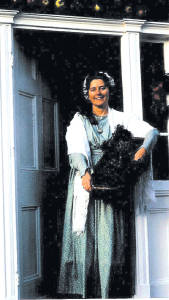Striving to grow love of gardening
Editor’s note: This is the final article in a series to observe National Women’s History Month. Businesswoman, horticulture historian and master gardener Betsey-Ann Golon empowers others by teaching them about gardening, cooking with local produce and herbs, canning and preserving.
By Dawn De Busk
Staff Writer

BETSEY GOLON, owner of Common Folk Farm, is pic- tured here in period costume while working at the Shaker Village.
NAPLES — Betsey-Ann Golon finds it difficult to digest how far-reaching a customer base Common Folk Farm has established.
The business she owns with her husband has items on the shelves of the L.L.Bean store in Freeport, and in the gift shops of the Smithsonian Museum and the Mount Vernon Visitors’ Center. Then, as she is filling out an order of blueberry tea to be shipped to Japan, it hits her.
The Common Folk Farm products are not the only ones traveling.
Her jet-setting lifestyle takes her by surprise. In mid-March, she spent eight days at the world’s largest flower show, the Philadelphia Flower Show, where she was both a vendor and a guest speaker. In mid-February, she spoke at an event in Boston only days after sharing her love for cooking with lavender during an intimate workshop at the Inn on Long Lake.
“I am not metropolitan. I consider myself a Maine farm girl,†Golon said. “My life is like a counterpoint, a pendulum swinging back and forth. I am a grounded person who loves being home, loves being in the garden. But, I am on the road speaking from the end of January until spring, until I get in the garden again.â€
During the summer, she joyfully dedicates the warm days to working in the lavender fields at Sabbathday Lake Shaker Village in New Gloucester. For eight years, she has served as the garden director on the intern program.
Serendipitously, her top hobby — gardening — has become not only a thriving business, but also a skill upon which she relied while employed in what seemed to be unrelated fields such as medical research.
Also serendipitously, at a flower show, Golon conversed with the new owner of Landreth Seeds. When the weekend wrapped up, Golon signed on as the spokeswoman for Landreth Seeds, a company that sells heirloom seeds, and has a history that dates back almost 250 years.
The original owner, David Landreth, sold seeds to George Washington, Thomas Jefferson, James Madison and other well-known American forefathers, she said.
“What I’d most want to do is teach the history of horticulture,†she said. “I want to teach an appreciation for what we have lost in our culture. It should have been handed down from grandmother to grandchildren.â€
She explained, “We’ve lost a generation of canners. We moved away from our grandmothers teaching us. A generation did not learn what they could grow in their gardens instead of buying. ‘Oh my word, what would happen if I cannot go to the grocery store?’â€
For Golon, the love of gardening was passed from father to daughter. Also, other women in her life contributed to her gardening knowledge.
“My dad loved to garden and got to garden around the world because he was in the military,†she said.
That military lifestyle exposed her to gardening in both southern and northern climates.
“In the 1970s, we had the movement of going back to earth and learning to garden,†she said. “I was lucky. There was a farm behind the building we lived in. I was a college student, and a wonderful woman took me under her wing.â€
In addition to teaching how to plant a garden on a small plot, the woman shared her knowledge of canning and preserving.
“We are having another renaissance of that spirit,†Golon said. “There should be even more pressure for people to learn how to garden and save money. Look how many people go to the farmers’ markets. Buying local is supporting the community. The new movement might not be a back to the earth, as much as a refocus on the community. It was the community that made us successful as a small family business. I want to continue to do for the community.â€
In summary, Golon simply said, “Life takes you on some unexpected journeys.â€
When the Golons’ two sons were attending Lake Region High School, the couple marketed their business at trade shows. In 1994, Common Folk Farm appeared on the QVC, and their small at-home business soared toward success. But in 1996, their 16-year-old son was involved in a motor vehicle accident that would require a year of rehabilitation.
The couple made the joint decision to step back from marketing their business, stay home, and help their son with his recovery “first and foremost,†she said.
When her son went back to school the following year, he was in a wheelchair. He vowed he would move to crutches before his graduation. He accepted his diploma by walking across the stage.
“We made the right choice by choosing the family over the business,†she said.
Frequently, Golon speaks proudly of her two sons — their education and satisfying careers in their chosen fields.
“But, their mom and dad are still trying to figure out how to slow down the pace of our lifestyle,†she laughed as the word “retirement†tickled her tongue. “If you are doing your passion with your work, you are fortunate. My kids ask me, ‘Mom, when are you going to retire?’ And I say, ‘I didn’t know I had to.’â€

